Russian Prime Minister: Russian Economy Grows by 20% since Beginning of 2000 - 25 September, 2002
According to Rosbalt's correspondent, Russian Prime Minister Mikhail Kasyanov this morning revealed, during a presentation at a plenary session of the State Duma of a paper on the country's socio-economic situation, that economic growth in Russia since the start of 2000 has been 20%.The Prime Minister claimed that the positive development of economic processes has allowed the Government to raise pensions and the salaries of state employees on several occasions. Incomes have risen by 25% over the last two years and 'this has been a key factor in economic development', said Kasyanov. According to his figures, real incomes rose by 7.7% merely in January-August 2002.
Kasyanov believes that the main problem facing Russia today is slow growth in investments in fixed capital. 'Existing facilities have, on the whole, been exhausted, and opportunities for extensively increasing production have almost run out,' he stressed. 'In the first 8 months of 2002 capital investment rose by only 2.5%, which is unacceptable for Russian industry, which needs to quickly modernise its equipment in order to further increase labour productivity'. Kasyanov also underlined that more than half of investment continues to be in the natural monopolies and the raw materials sector of the economy.
The Prime Minister stressed that 'these negative tendencies in the sphere of investment can only be overcome on the basis of continued intensive efforts across all sectors of the reforms begun by the Government. This process will be aided by carrying out the measures included in the bills on reforming the natural monopolies and the financial sector of the economy, which are a priority for the Government'.
Kasyanov said that the draft budget for 2003, which Duma deputies are to give a first reading on September 25, 'maintains a course of lowering the tax burden on the economy and reducing non-interest expenses, which will account for 13% of GNP next year'. The Government estimates that inflation in 2003 will fall by at least 2%. The budget surplus, according to Kasyanov, 'will enable Russia to get through the peak year for servicing her foreign debt without any loss to the economy or the social sector'.
Subscribe to Pravda.Ru Telegram channel, Facebook, RSS!





